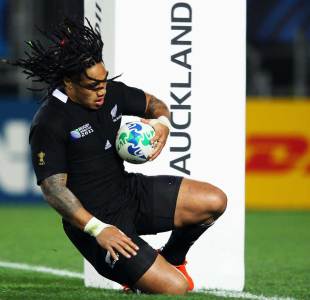|
Japan Rugby Top League
A new superpower?
Rich Freeman
October 28, 2011

Ma'a Nonu is just one of the stellar names journeying to the Far East
© Getty Images
Enlarge
The Japan Rugby Top League kicks off its ninth season at the weekend with its biggest influx yet of big-name foreigners, no mean feat given some of the names who have played here over the years. Three members of the All Blacks squad that won the 2011 Rugby World Cup, three members of the 2007 Springbok RWC side together with their technical coach and a host of other internationals will all be plying their trade in Japan this year. Suntory Sungoliath and Ricoh Black Rams top the big spenders with Fourie du Preez, George Smith and Danie Rossouw joining Eddie Jones at Suntory, while Ma'a Nonu and James Haskell will suit up for Ricoh. Meanwhile, Brad Thorn will head to Fukuoka to play for Sanix Blues, Mils Muliaina joins newly promoted NTT Docomo Red Hurricanes and Jaque Fourie joins Panasonic Wild Knights - who gave Sanyo a league championship last year before the company was bought up by Panasonic. Jones guided Suntory to second spot in the league before they went on to win the season ending All-Japan Championship and will have his work cut out trying to keep his foreign contingent happy. Top League rules currently allow teams to field three foreigners and one Asian passport holder at any one time and in addition to the three new signings, Suntory also boast Peter Hewat, Tusi Pisi and Todd Clever. The club also has Ryan Nicholas on its books, but like a number of player who have been here for a number of years, Nicholas has taken out Japanese citizenship, meaning he is no longer part of the foreign quota. Next year the league will reduce the number to two foreign players and an Asian, causing some concern for former Japan coach John Kirwan. "The proposed law will help the Asian countries, which is good as more Korean, Indian and Chinese players will head here," he said. "But it could have a negative effect on the Japanese team." Kirwan and Jones both agree the present law allowing three is the perfect mix, as it allows the local players to learn from some of the greats in the game, and also helps attract crowds, which are still way short of those experienced by soccer's J. League. Jones also said short-term contracts such as the ones given to Haskell, Nonu and Fourie were not his cup of tea. "Smith has signed with us for three years and I think that will really help the club and players," he said. The league opens with Suntory taking on Panasonic and both sides should be in the top half of the table, come the end of the season, when the top four play off for the league title. In addition to the foreigners, both clubs have good depth in local players, a point expanded on by Jones. "The foreigners don't win the games on their own," he said. "You need team work you need good local players." Toyota Verblitz, who welcome back Filo Tiatia as forwards coach, should also be in the mix for the playoffs, as should Toshiba Brave Lupus, though new coach Kenishi Wada will need to pace some of the more senior members of the team. Thorn's presence at Sanix could see the Blues finally get some consistency. Yuichiro Fujii's team played some breathtaking rugby last year and if they can solve their defensive problems, Fukuoka will be a hard team to beat. Elsewhere the story is more about consolidation. Kobe Kobelco Steelers welcome former Scotland lock Scott MacLeod to the port town, where he will join Hrishikesh Pendse, the first Indian to play in the league. Nili Latu leads a rejuvenated NEC Green Rockets, while Ricoh will be hoping their big-name signings will help surpass last year's seventh place, their best ever finish in the league. Rico Gear (Kintetsu Liners), Shaun Webb (Coca-Cola West Red Sparks), Isaac Ross (NTT Communications Shining Arcs), Jerry Collins (Yamaha Jubilo) and Rodney So'oialo (Honda Heat), meanwhile, could find all themselves in a fight for survival with the bottom two sides automatically relegated and the teams finishing 11th and 12th entering a playoff with the third and fourth best teams from the regional league to decide who plays in the top flight next year. And for any aspiring player out there, who fancies a gig overseas, it's not just the 14-team elite division that is attracting the big names, with the likes of Dave Walder (Mitsubishi Dynaboars), Seilala Mapusua (Kubota Spears) and Chris Jack (Kyuden Voltex) all joining teams in the regional leagues that feed into the Top League. No wonder Kirwan has said he thinks the Top League could one day rival the English and French leagues - not just in terms of attracting players but in the strength of competition. © ESPN Sports Media Ltd.
|
Live Sports
Communication error please reload the page.
-
Football
-
Cricket
-
Rugby
-
- Days
- Hrs
- Mins
- Secs
F1 - Abu Dhabi GP
Abu Dhabi Grand Prix December 11-131. Max Verstappen ()
2. Valtteri Bottas (Mercedes)
3. Lewis Hamilton (Mercedes)
4. Alexander Albon ()
5. Lando Norris ()
6. Carlos Sainz Jr ()
-
ESPNOtherLive >>
Snooker - China Open
Tennis - Miami Open

